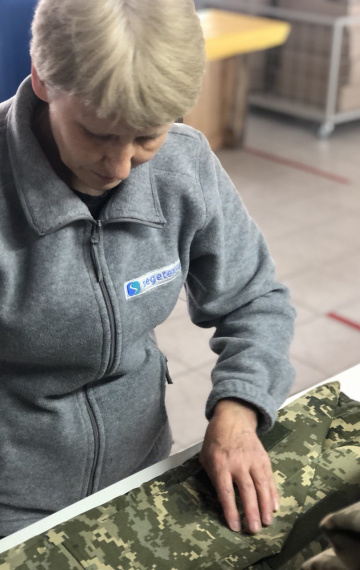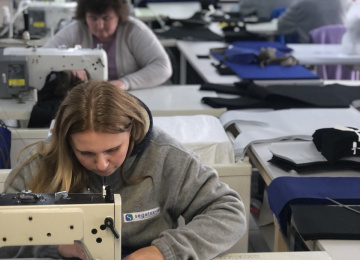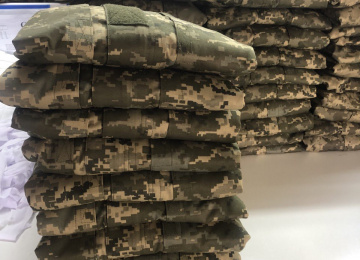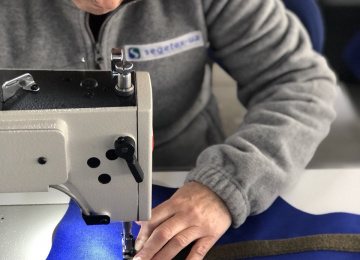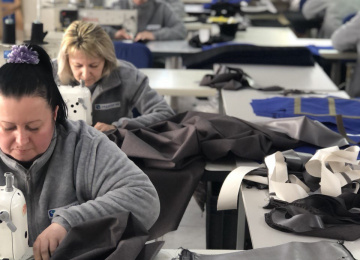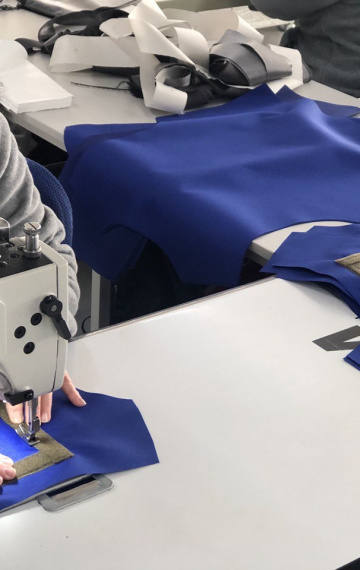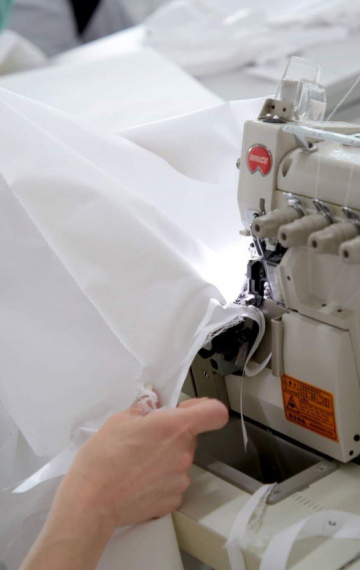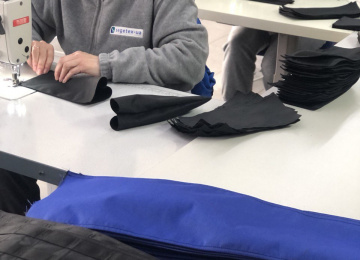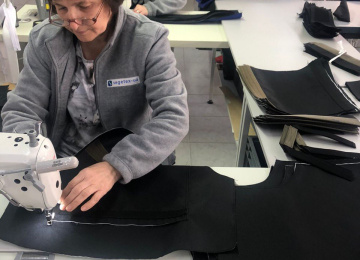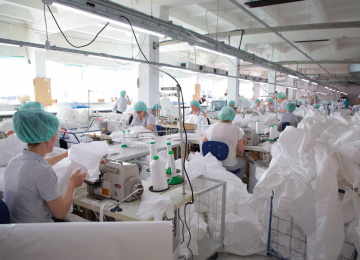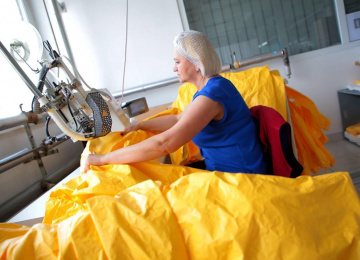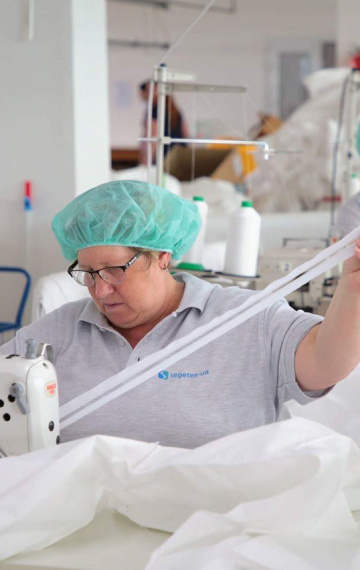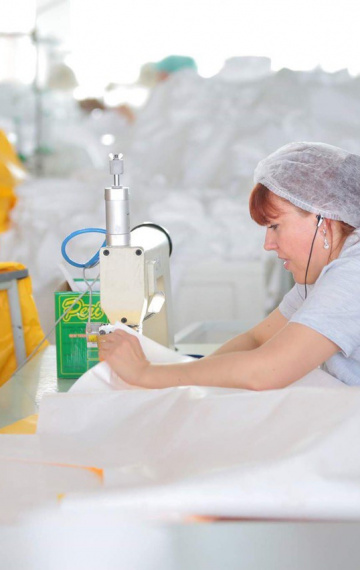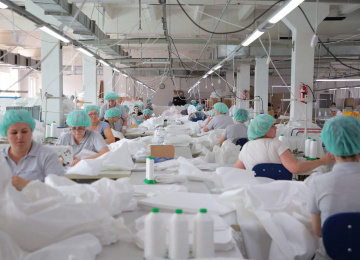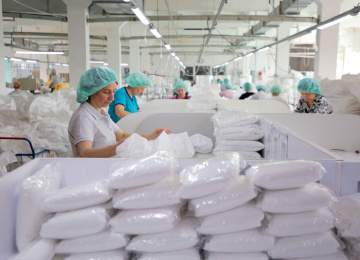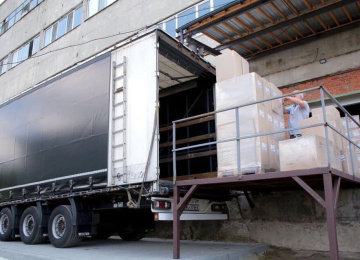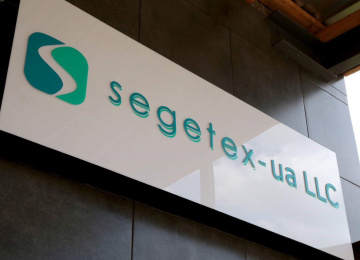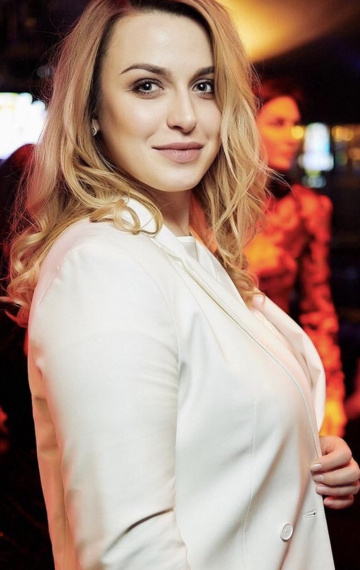
War makes a Lviv company change direction – with a little help from its friends in an EU-supported business cluster.
When the air raid sirens blare in the city of Lviv in western Ukraine, the 40 employees of clothing maker Segetex-UA down tools and troop down to an underground shelter in the basement. They spend 2-3 hours there, sometimes more, and mostly in silence, before getting back to work – producing work clothes and PPE amid Russia’s full-scale invasion of Ukraine.
Segetex-UA is a French-owned company, first established in 2001 to produce medical personal protection equipment or PPE, such as coveralls and other garments for hospitals, nuclear stations, vaccine laboratories, paint workshops for car production, and so on. Its mother company, Segetex-eif, also manufactures and markets non-woven clothing such a PPE, accessories and wipes for industrial workers, and hygiene and beauty products for hairdressing and beauty salons.
Segetex-UA underwent reorganization in 2019, and just a year later COVID-19 struck the world, and the company found itself in the frontline of the pandemic. The team knew right away that there would be an increased need for medical protective clothing, so they quickly ramped up production offering an extended range of products – from FFP2 masks to medical suits and visitor coverall blouses.
So in fact, the pandemic meant good business for Segetex-UA – but that changed with the onset of Russia’s full-scale invasion in Ukraine at the end of February 2022. Stunned by the initial shock of being in a full-scale war, the team stopped working, but only for a while.
“In the first two weeks, everybody was scared, and there was lots of tension,” says Oksana Galyo, director of the sewing production at Segetex-UA.
“But then we decided that production needs to go on,” she adds, noting that the team soon became accustomed to air raid sirens in Lviv and returned to work.
“We need to be adaptable given the situation in Lviv. At the moment, it’s more or less safe for us – well, as safe as it can be during a war.”
As the team went back to work there was already increased demand for one particular type of clothing in the country – uniforms that require special equipment for strong stitching that can stand up to the roughest of treatment.
“We could use 80% of our equipment, but there were other machines that we didn’t have,” says Galyo. “It wouldn’t be logical to buy equipment for occasional orders – it would be an extra cost for us if the orders stopped coming in, and then we’d have equipment that we wouldn’t be using.”
Also, since most of the required equipment in made China, it would have taken the company months to start its working clothing line.
But luckily, Segetex-UA was part of the West Ukrainian Fashion Cluster – an association of companies, entrepreneurs, and people who strive to develop the industry. And with support from the EU4Business programme, the cluster has got two powerful specialized machines for fastening seams onto load-resistant clothing (including military uniforms). All of the cluster’s 28 member companies, including Segetex-UA, can now use the machines for their production.
Sharing specialized equipment was the ideal solution: it made it possible for cluster members to complete custom orders without each having to spend a lot of money buying machines solely for their own needs. For Segetex-UA, this opened a whole new field of opportunities, with the company creating a separate line of military clothing, including bulletproof vests, t-shirts, bags, and more.
And access to specialized machines is not the only benefit the cluster members obtain: Galyo says the organizations provides for more effective communication, which is especially important now, when all orders need to be processed very quickly.
“The cluster knows who is running at full capacity, and who needs additional orders,” she explains.
“As a rule, if someone needs some orders to be processed, the first thing they do is inform the cluster – then the people who are processing the orders don’t have to search about for a company to fulfil them.”
The West Ukrainian Fashion Cluster was created in 2018, and since 2021 it has been supported by the “EU4Business: Competitiveness and Internationalisation of SMEs”, a programme funded by the European Union and implemented by the German federal company Deutsche Gesellschaft für Internationale Zusammenarbeit (GIZ) GmbH. The cluster brings together participants who build innovative, strong brands and proudly say, “This was made in Ukraine!”
Cluster is also using the sewing equipment in the “Sewing mastery” project aimed at creating workplaces for the experts from the light industry.
Cluster members obtain support from like-minded people, join collaborative projects, and gain the opportunity to build useful relationships. Galyo said being part of the cluster has helped her company in its everyday activities, which is especially useful in times of upheavel, when businesses must be nimble and ever on the lookout for new directions.
For Segetex-UA, the changes may be a long-term ones: Galyo said the company wants to continue making its new line of working clothes, but hopefully in peacetime.
“We got started, we got some results, and saw that we were doing well,” she says.
“So, we can keep going along the same path. It’s opened up a new area of production for us.”

